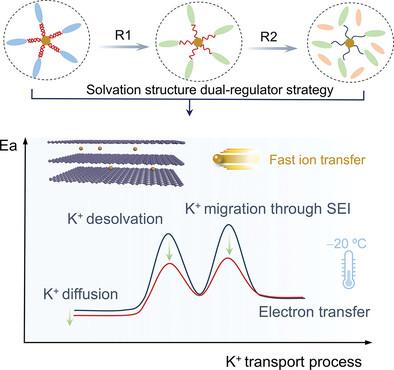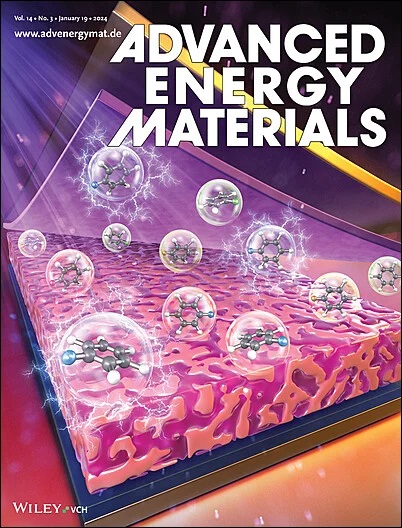Solvation Structure Dual-Regulator Enabled Multidimensional Improvement for Low-Temperature Potassium Ion Batteries
IF 24.4
1区 材料科学
Q1 CHEMISTRY, PHYSICAL
引用次数: 0
Abstract
The operation of graphite-based potassium ion batteries (Gr-PIBs) remains challenging at low temperatures, limited by slow dynamic behavior. Herein, the solvation structure dual-regulator strategy of electrolyte is proposed for multidimensional improvement of K+ transfer process including ion transfer at both bulk and interface. The designed electrolyte (an amide solvent, 2,2,2-Trifluoro-N, N-dimethylacetamide) with low freezing point and low viscosity as the primary regulator, and a fluorinated solvent (1,1,2,2-Tetrafluoroethyl-2,2,3,3-tetrafluoropropylether) as the secondary regulator provides a flowing environment and low resistive interface for fast ion transfer. As a result, the regulated electrolyte has a low freezing point of −51.9 °C and exhibits a high ionic conductivity of 3.2 mS cm−1 at −20 °C. Based on the solvation structure dual-regulator, the graphite anode delivered a high capacity of 252 mAh g−1 which is over 85% of room-temperature capacity, and the capacity retention rate of a full cell at −20 °C is over 80%. These results demonstrate that the solvation structure dual-regulator can improve the performances of Gr-PIBs, promoting the development of low-temperature PIBs and beyond.

溶解结构双调节器实现了低温钾离子电池的多维改进
石墨基钾离子电池(Gr-PIBs)在低温条件下的运行仍然具有挑战性,因为它受到缓慢的动态行为的限制。本文提出了电解质的溶解结构双调节策略,以多维度改善 K+ 的转移过程,包括体外和界面的离子转移。所设计的电解质(酰胺溶剂,2,2,2-三氟-N,N-二甲基乙酰胺)具有低凝固点和低粘度,可作为主要调节剂,而含氟溶剂(1,1,2,2-四氟乙基-2,2,3,3-四氟丙基醚)则可作为辅助调节剂,为快速离子转移提供流动环境和低电阻界面。因此,调节电解质的凝固点低至 -51.9 °C,在 -20 °C时离子电导率高达 3.2 mS cm-1。基于溶解结构双调节器,石墨阳极可提供 252 mAh g-1 的高容量,相当于室温容量的 85% 以上,而全电池在 -20 °C 时的容量保持率超过 80%。这些结果表明,溶解结构双调节剂可以提高 Gr-PIB 的性能,促进低温 PIB 及其他材料的发展。
本文章由计算机程序翻译,如有差异,请以英文原文为准。
求助全文
约1分钟内获得全文
求助全文
来源期刊

Advanced Energy Materials
CHEMISTRY, PHYSICAL-ENERGY & FUELS
CiteScore
41.90
自引率
4.00%
发文量
889
审稿时长
1.4 months
期刊介绍:
Established in 2011, Advanced Energy Materials is an international, interdisciplinary, English-language journal that focuses on materials used in energy harvesting, conversion, and storage. It is regarded as a top-quality journal alongside Advanced Materials, Advanced Functional Materials, and Small.
With a 2022 Impact Factor of 27.8, Advanced Energy Materials is considered a prime source for the best energy-related research. The journal covers a wide range of topics in energy-related research, including organic and inorganic photovoltaics, batteries and supercapacitors, fuel cells, hydrogen generation and storage, thermoelectrics, water splitting and photocatalysis, solar fuels and thermosolar power, magnetocalorics, and piezoelectronics.
The readership of Advanced Energy Materials includes materials scientists, chemists, physicists, and engineers in both academia and industry. The journal is indexed in various databases and collections, such as Advanced Technologies & Aerospace Database, FIZ Karlsruhe, INSPEC (IET), Science Citation Index Expanded, Technology Collection, and Web of Science, among others.
 求助内容:
求助内容: 应助结果提醒方式:
应助结果提醒方式:


